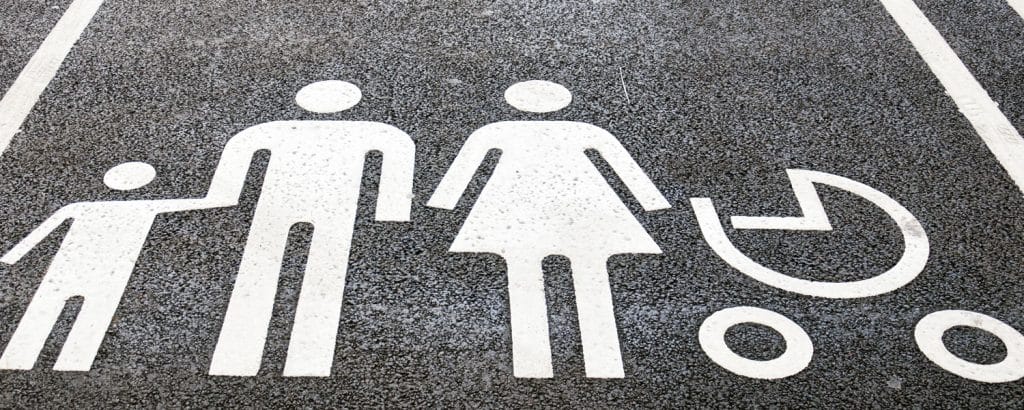Child custody cases can be complex and emotionally charged. Often there are issues that are difficult to resolve, especially when one parent has a disability. Courts are supposed to prioritize the best interests of the child when making custody determinations, but they must also ensure that disabled parents receive fair and equal treatment under the law. This article will answer the question, “How does child custody work if one parent has a disability?”

Legal Protections for Disabled Parents
There are many different types of disabilities/illnesses including physical and mental. Regardless of your disability or illness, you still have parental rights under the law. The Americans with Disabilities Act (ADA) and many other federal/state laws prohibit discrimination against individuals with disabilities, including in child custody cases. Courts cannot deny custody or visitation rights based solely on a parent’s disability/illness. Instead, they must assess each parent’s ability to provide a safe and nurturing environment for the child.
Factors Courts Consider in Custody Decisions
Judges consider what will be in the best interests of the child when coming to custody decisions. When determining what custody arrangement will be in the child’s best interests, courts evaluate various factors, including:
- Parental Capability: The court examines whether the disabled parent can meet the child’s physical, emotional, and educational needs. If the parent requires assistance, courts may consider the availability of support systems, such as family members or in-home aides.
- Child’s Best Interests: The child’s well-being remains the top priority. Factors such as stability and a strong emotional connection/bond can play a crucial role in the court’s final decision.
- Parental Cooperation: Courts favor parents who can effectively communicate and work together to co-parent, regardless of disability. Generally, the courts have decided it is in the child’s best interests to have both parents involved actively in the child’s life if possible
- Impact of Disability: The court assesses whether the disability affects the parent’s ability to care for the child. If accommodations or assistive technologies enable the parent to fulfill caregiving duties, the court must take this into account.
Types of Custody Arrangements
There are multiple types of custody arrangements. Depending on the circumstances, a disabled parent may be awarded different types of custody:
- Legal Custody: A parent with legal custody can make major decisions regarding how the child is raised (i.e. raised in a certain religion or not).
- Physical Custody: A parent with physical custody decides where they and the child will live. Parents can share physical custody where parenting time is split. If one parent has majority physical custody, then they are typically called the custodial parent.
- Joint Custody: Both parents share legal and/or physical custody, allowing the child to maintain relationships with both parents. Parents can have joint legal custody and joint physical custody.
- Sole Custody: One parent has full custody, either legal, physical, or both, while the other might receive visitation rights. Sole custody is only ever considered if the court finds that the disabled parent cannot provide sufficient care without significant risk to the saftey of the child. Typically, both parents will have a right to see their child and help make significant decisions in how the child is raised. To learn more check out our article titled, “Can You Lose Custody for Child Endangerment in Illinois?“
- Modified Custody Arrangements: Courts may grant flexible visitation schedules or supervised visitation to ensure the child’s safety while maintaining parental involvement.
Proving Parental Fitness
Regardless of how much your disability affects you, you may have to prove your parental fitness in court. People with disabilities or mental illnesses will likely face some unfair discrimination when having to prove they are fit to parent. A disabled parent facing custody challenges will likely have to work harder to prove fitness, but they can take proactive steps to demonstrate their ability to care for their child, such as:
- Providing medical records or expert testimony supporting their capability as a parent.
- Showing evidence of a support network that assists with caregiving.
- Demonstrating how adaptive technology or reasonable accommodations enable effective parenting.
- Presenting character references from teachers, doctors, or community members who can attest to their parenting ability.
You may be worried that your partner will make false allegations regarding your parental fitness, but with strong evidence and a good legal strategy you can win your case. To learn more about evidence, check out our article titled “How to Fight False Allegations in Child Custody.”

Seeking Legal Assistance
Because child custody cases involving a disabled parent can be legally intricate, seeking guidance from an experienced family law attorney can be crucial to getting a better outcome. A lawyer can help disabled parents know their rights, advocate for their rights, navigate custody proceedings, and present evidence that demonstrates their ability to provide a stable and loving home for their child.
Conclusion: How Does Child Custody Work If One Parent Has a Disability?
A parent’s disability does not automatically disqualify them from obtaining custody. Courts must base their decisions on the child’s best interests while ensuring fair treatment under the law. By understanding their legal rights and seeking appropriate legal support, disabled parents can effectively advocate for their role in their child’s life.
MEET WITH AN ILLINOIS FAMILY LAW ATTORNEY TODAY
The Family Law attorneys at Koth Gregory & Nieminski understand that your family is the top priority, which is why we offer SAME-DAY APPOINTMENTS. If you need a divorce or other family law services, you can schedule your first meeting through our online appointment calendar. We look forward to meeting you.
Disclaimer: This article (How Does Child Custody Work If One Parent Has a Disability?) may contain information that is outdated as Illinois law continuously evolves. Meeting with an experienced family law attorney is the best way to ensure you are receiving the most current information to answer the question How Does Child Custody Work If One Parent Has a Disability?

Published by Dustin Koth on March 4, 2025

